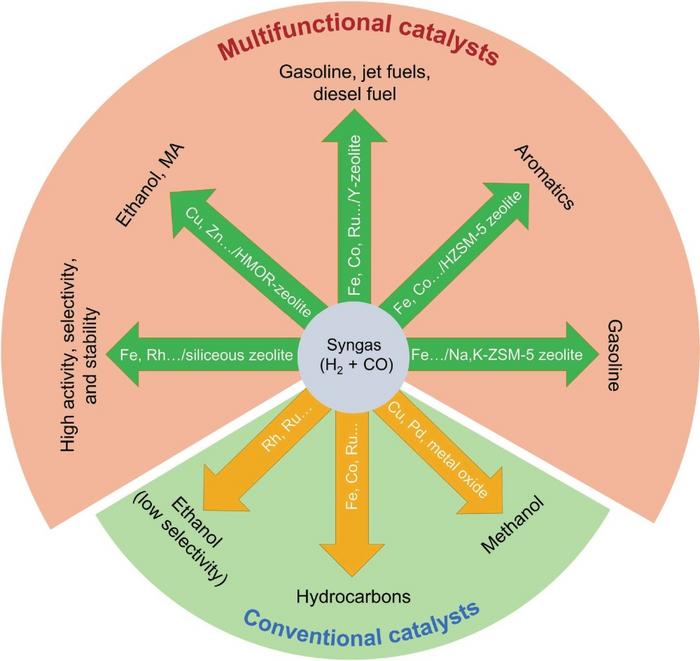The fuels used today depend heavily on petroleum. As the demand grows, scientists are looking for ways to produce fuels that do not require petroleum. A research team set out to examine the role of zeolites in the conversion of synthetic gas to fuels. Wanting to better understand how zeolites regulate the reaction pathways, they reviewed the most recent advancements in synthetic gas conversion with catalysts containing zeolites.

Credit: Carbon Future, Tsinghua University Press
The fuels used today depend heavily on petroleum. As the demand grows, scientists are looking for ways to produce fuels that do not require petroleum. A research team set out to examine the role of zeolites in the conversion of synthetic gas to fuels. Wanting to better understand how zeolites regulate the reaction pathways, they reviewed the most recent advancements in synthetic gas conversion with catalysts containing zeolites.
Their review paper is published in the journal Carbon Future on July 28, 2023.
As an alternative to fuels dependent on petroleum, for a long time scientists have looked to synthetic gas, or syngas, as a solution. Syngas is a mixture of carbon monoxide and hydrogen gas that is easily obtained from coal, natural gas, and biomass. For about 100 years, scientists have studied the conversion of syngas into valuable fuels and chemicals.
The Fischer-Tropsch synthesis (FTS) is a successful route that scientists use for syngas conversion into hydrocarbons. This popular conversion method was invented by Franz Fischer and Hans Tropsch in the 1920s. In this process a series of chemical reactions produce hydrocarbons. Scientists use various models to determine the selectivity of this FTS process. The simplest and most widely used is the Anderson–Schulz–Flory (ASF) model.
Generally the products resulting from the conventional FTS method adhere to the Anderson-Schulz-Flory model and are limited. As an example, olefins, alkanes, and gasoline fraction have a limited value of content at only about 58% and 48%. Scientists need a way to optimize the product distributions from the FTS process. Yet this remains a challenge.
Scientists have found that zeolite effectively optimizes the reaction pathways beyond the conventional FTS method. Zeolites are hydrated aluminosilicate minerals. They are solids, but have a three-dimensional crystal structure that allows them to take in and lose liquid easily.
The zeolite works to regulate the reaction process. With zeolites, scientists have been able to improve the selectivity of gasoline, jet fuel, and diesel. These results are an improvement over the results seen with the Anderson-Schulz-Flory model. They have also achieved numerous aromatic products, using zeolite catalysts. “In light of these results, we thought it was appropriate to review and discuss the recent advancements in the significance of zeolites in syngas conversion,” said Liang Wang, a professor with the College of Chemical and Biological Engineering, Zhejiang University.
The research team reviewed the most recent advancements in FTS over catalysts containing zeolites. They also examined the role of zeolites and their structure-performance interplay. “Based on the catalytic mechanism, it is expected that the rational design of zeolites will be helpful for the development of more effective catalysts and reaction processes,” said Wang.
From their study, the team determined that zeolite effectively optimizes the reaction pathways beyond the conventional FTS process. They believe that zeolite-assisted syngas conversion is still growing. They make several recommendations for areas where future research might be focused. Up till now mostly aluminosilicate zeolites have been used, working with the FTS catalyst. The team recommends that more zeolite properties should be considered in future studies.
Scientists exploring the structure-activity relationship of catalytic materials at the atomic scale have benefited greatly from advances using in situ characterizations and theoretical simulation methods. The team recommends that future research in this area’s focus on combining artificial intelligence and massive data. Focusing in this way will allow researchers to design catalyst structure by better understanding the elementary steps. “This will provide the foundation and research direction for understanding the reaction mechanism, and finally designing the corresponding zeolites,” said Wang.
The research team includes Hangjie Li, Liang Wang, and Feng-Shou Xiao from the Key Lab of Biomass Chemical Engineering of Ministry of Education, College of Chemical and Biological Engineering, Zhejiang University.
The research is funded by the National Key Research and Development Program of China and the National Natural Science Foundation of China.
##
About Carbon Future
Carbon Future is an open access, peer-reviewed and international interdisciplinary journal that reports carbon-related materials and processes, including catalysis, energy conversion and storage, as well as low carbon emission process and engineering. Carbon Future will publish Research Articles, Reviews, Minireviews, Highlights, Perspectives, and News and Views from all aspects concerned with carbon. Carbon Future will publish articles that focus on, but not limited to, the following areas: carbon-related or -derived materials, carbon-related catalysis and fundamentals, low carbon-related energy conversion and storage, low carbon emission chemical processes.
About SciOpen
SciOpen is a professional open access resource for discovery of scientific and technical content published by the Tsinghua University Press and its publishing partners, providing the scholarly publishing community with innovative technology and market-leading capabilities. SciOpen provides end-to-end services across manuscript submission, peer review, content hosting, analytics, and identity management and expert advice to ensure each journal’s development by offering a range of options across all functions as Journal Layout, Production Services, Editorial Services, Marketing and Promotions, Online Functionality, etc. By digitalizing the publishing process, SciOpen widens the reach, deepens the impact, and accelerates the exchange of ideas.
Journal
Carbon Future
DOI
10.26599/CF.2023.9200003
Article Title
Importance of zeolite in multifunctional catalysts for syngas conversion
Article Publication Date
28-Jul-2023




